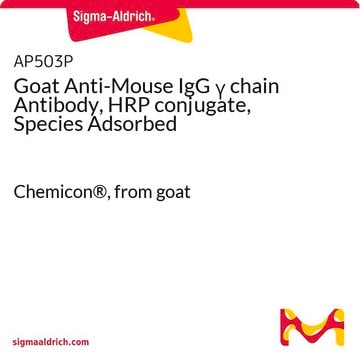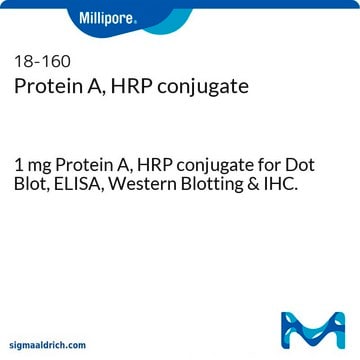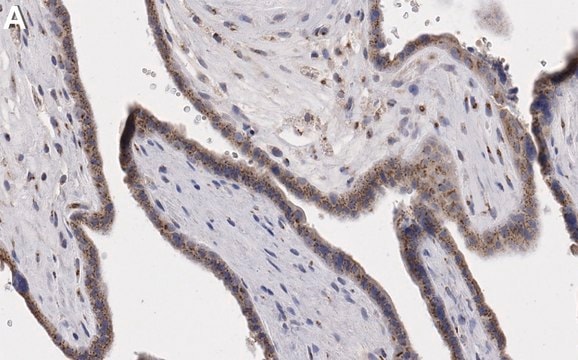MAB8701
Anti-Dengue Virus Type I Antibody, clone 15F3-1
clone 15F3-1, Chemicon®, from mouse
Se connecterpour consulter vos tarifs contractuels et ceux de votre entreprise/organisme
About This Item
Code UNSPSC :
12352203
eCl@ss :
32160702
Nomenclature NACRES :
NA.41
Produits recommandés
Source biologique
mouse
Niveau de qualité
Forme d'anticorps
purified antibody
Clone
15F3-1, monoclonal
Espèces réactives
human
Fabricant/nom de marque
Chemicon®
Technique(s)
immunofluorescence: suitable
Isotype
IgG1
Conditions d'expédition
wet ice
Description générale
Dengue fever is an acute, mosquito-transmitted viral disease characterized by fever, headache, arthralgia (severe retro-orbital pain), myalgia, rash, nausea, and vomiting. Infections are caused by any of the four closely related, but antigenically distinct virus serotypes (DEN-1, DEN-2, DEN-3, and DEN-4). Infection with one of these serotypes does not provide cross-protective immunity, so persons living in a dengue-endemic area can have four dengue infections during their lifetimes. Dengue is primarily an urban disease of the tropics, and the viruses that cause it are maintained in a cycle that involves humans and Aedes aegypti, a domestic, day-biting mosquito that prefers to feed on humans. Although most dengue infections result in relatively mild illness, some can produce Dengue Hemorrhagic Fever (DHF) or dengue shock syndrome, with children being particularly at risk. Although epidemic outbreaks have been reported since 1779, the incidence has been increasing, with global, multiple serotype pandemics intensifying within the last 15 years. There is no specific antiviral therapy for dengue, but for both classical dengue and dengue hemorrhagic fever, symptomatic and supportive measures are effective. Important risk factors for DHF include the strain and serotype of the virus involved, as well as the age, immune status, and genetic predisposition of the patient.
Spécificité
Reacts with the Dengue type 1 virus. May show reactivity with Dengue type 2 virus.
Immunogène
Dengue type 1 (Hawaiian) virus antigen.
Application
Anti-Dengue Virus Type I Antibody, clone 15F3-1 detects level of Dengue Virus Type I & has been published & validated for use in IF.
Immunofluorescent assay. Final working dilutions must be determined by end user.
Forme physique
0.02M Phosphate Buffer, pH 7.6, 0.25M NaCl and 0.1% sodium azide.
Format: Purified
Autres remarques
Concentration: Please refer to the Certificate of Analysis for the lot-specific concentration.
Informations légales
CHEMICON is a registered trademark of Merck KGaA, Darmstadt, Germany
Code de la classe de stockage
10 - Combustible liquids
Classe de danger pour l'eau (WGK)
WGK 2
Point d'éclair (°F)
Not applicable
Point d'éclair (°C)
Not applicable
Certificats d'analyse (COA)
Recherchez un Certificats d'analyse (COA) en saisissant le numéro de lot du produit. Les numéros de lot figurent sur l'étiquette du produit après les mots "Lot" ou "Batch".
Déjà en possession de ce produit ?
Retrouvez la documentation relative aux produits que vous avez récemment achetés dans la Bibliothèque de documents.
Sambashiva Banala et al.
ACS chemical biology, 8(10), 2127-2132 (2013-08-15)
Detection of antibodies is essential for the diagnosis of many diseases including infections, allergies, and autoimmune diseases. Current heterogeneous immunoassays require multiple time-consuming binding and washing steps, which limits their application in point-of-care diagnostics and high-throughput screening. Here, we report
Notre équipe de scientifiques dispose d'une expérience dans tous les secteurs de la recherche, notamment en sciences de la vie, science des matériaux, synthèse chimique, chromatographie, analyse et dans de nombreux autres domaines..
Contacter notre Service technique







